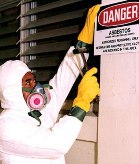Lukas Loeffler, who has worked as CEO of Siemens Industry Solutions business unit, will replace Chuck Gordon.
University of Wisconsin-Extension said academia must provide greater access to environmental education for adult returning students.

The Alliance for Hazardous Materials Professionals uses emergency response scenarios to train members on the protocols for life-threatening situations.
- By L.K. Williams, EPonline
The company excavated contaminated soil near and under parts of the Brook Village parking lot in North Providence, R.I., at a cost of about $1.7 million.
Following the request for information, the San Antonio Water System will release a request for proposals on water supply diversification.

The health risk and liabilities of this hazardous substance cost too much to ignore; the best approach is to eliminate the problem.
A U.S. Chamber of Commerce spokesman said that the federal agency is trying to fix flexible permitting, but the process was not broken.
Tennessee Clean Water Network, Statewide Organizing for Community eMpowerment, and the Sierra Club Tennessee Chapter had filed a Clean Water Act lawsuit against the company's discharges from a mountaintop removal mine.

One company minimizes odors from the start by quickly processing organic materials into the composting cell and employing covered aerated static pile technology.
The agency is "drilling down to bedrock" to uncover the impact of the process on drinking water sources.
AWWA reminds Obama of the need for funding repair and replacement of water treatment facilities and distribution systems.
Global Water Intelligence predicts the industry will not exceed its 2007 performance of 7.5 million cubic meters per day until 2012.

New positions, recognition and calls to service top this week's summary of movement within the environmental industry.
Long-standing pesticide faces government review, an activist campaign, and two lawsuits.
Students from Saint Martin's University found that less heat is lost using flat ceramic infrared electric emitters in research supported by Puget Sound Energy.
In one example, the Texas Commission on Environmental Quality did not allow adequate review of impacts on total air pollution levels should changes in the Pollution Control Project Standard Permit be approved, the federal agency reported.
The House Transportation and Infrastructure Committee said it has evidence that residents affected by the recent spill in Michigan are being asked to waive legal rights or sign over medical records.
By 2016, the state will require refiners to produce oil with a maximum sulfur content standard of 15 parts per million; the current standard is 2,000 to 3,000 parts per million.
Before the Motors Liquidation Company can demolish several buildings at the Massena, N.Y., site, it must decontaminate the buildings and their contents and sample and remove contaminated soil.